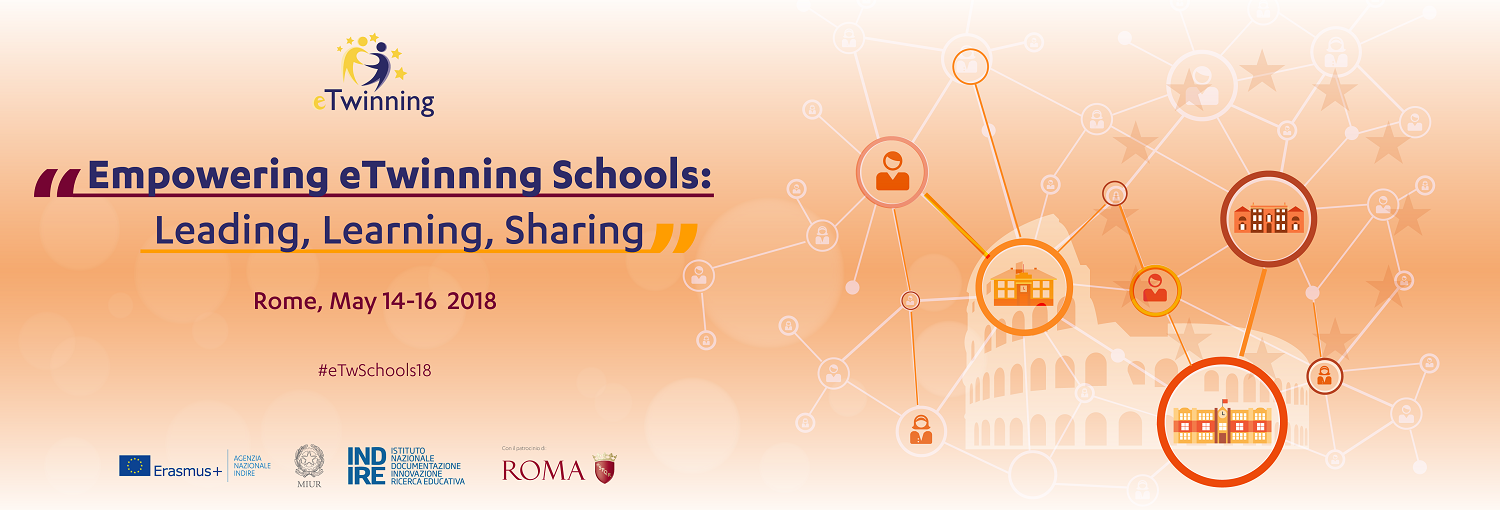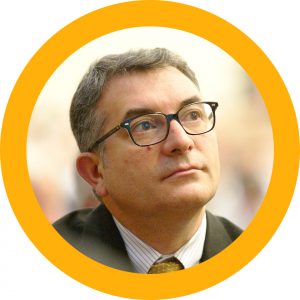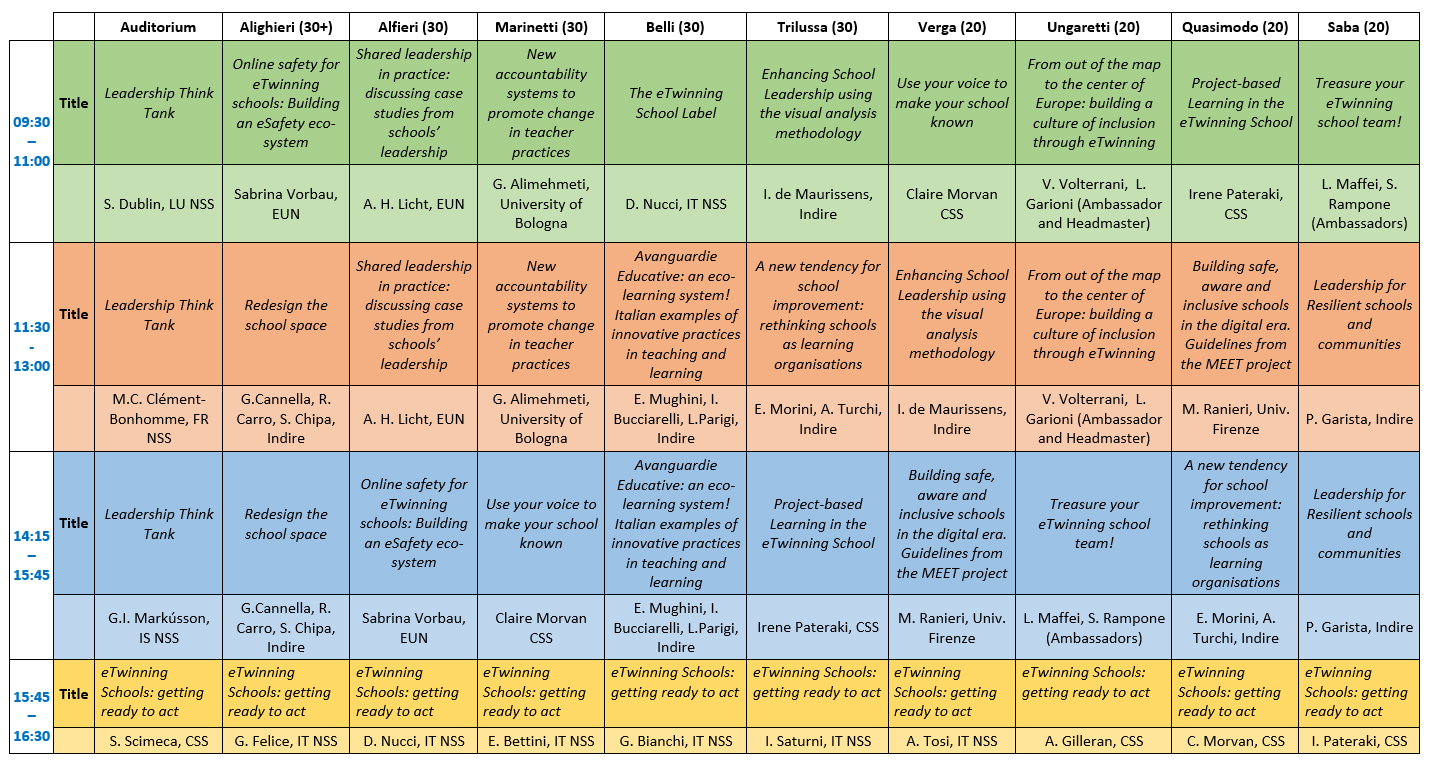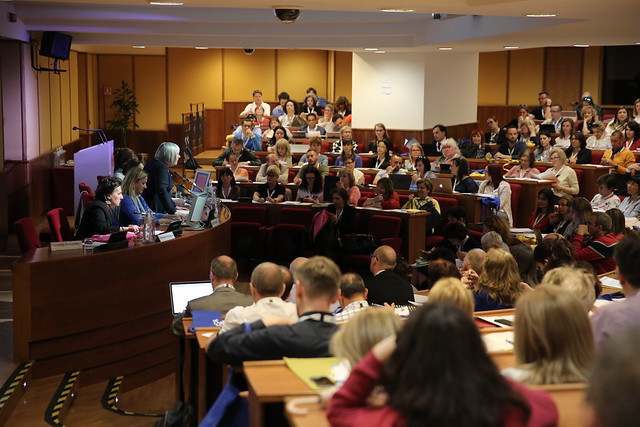Home » Sessions and materials
Sessions and materials

About |
Programme |
Sessions and materials |
Venues and info |
Keynote speakers and workshops presentations will be linked soon to the title in the list below.
Scroll down this page.
VIDEO INTERVIEWS
PHOTO GALLERY
KEYNOTE SPEAKERS
Patricia Wastiau
Principal Adviser for Research and Studies, European Schoolnet
Speech: “Shared Leadership: a mindset and tool to empower eTwinning schools”
Patricia Wastiau is Principal Adviser for Research & Innovation within European Schoolnet, the network of 34 ministries of education supporting innovation in education including through ICT integration. In terms of topics, she mostly covers innovation in education, with a more recent focus on innovative eco-systems, as well as in leadership for change and theories of change. Patricia Wastiau has joined European Schoolnet in 2008 after 10 years as Head of Eurydice, the European network about education in Europe. She has more than 20 years of experience in education systems and public policies analysis, their comparison at European level and the use of research results in education policy-making and practice (evidence based policy), particularly in innovation, change management, design-thinking and distributed leadership. She is member of several experts committees settled by the OECD and Unesco.
 Paul Downes
Paul Downes
Associate Professor of Education (Psychology), Director, Educational Disadvantage Centre, Dublin City University.
Dr. Paul Downes is Director of the Educational Disadvantage Centre, Associate Professor of Education (Psychology), Institute of Education, Dublin City University, Ireland. He has been involved in various expert advisory roles for the European Commission in areas of social inequalities, lifelong learning, second chance education and early school leaving, as well as being an adviser to a number of the European Commission’s School Policy Working Groups. He has been a Visiting Research Fellow at University of British Columbia, Vancouver, Canada, and University of Cambridge, Lauterpacht Centre for International Law, a member of the Irish Senate and Parliament Expert Group on early school leaving, an advisor to the Irish Education Ministry and Children’s Ministry and is Chair of Grangegorman Area Based Childhood Programme. Published internationally in areas of psychology, education, law, philosophy, anthropology and social policy, he has given keynote lectures and invited presentations on education in over 25 countries. His books include The Primordial Dance: Diametric and Concentric Spaces in the Unconscious World (2012) and Access to Education in Europe: A Framework and Agenda for System Change (2014). He has led recent reports for the EU Commission on structural indicators for inclusive systems and on school bullying. His contribution to international policy and practice includes invitations from 8 different countries’ official ministries to present his research on various aspects of inclusive systems in education, as well as from the EU Parliament Working Group on Quality of Childhood, EU Parliament Intergroup on Children’s Rights, European Network of Education Councils (EUNEC), and Unicef.
 Angelo Paletta
Angelo Paletta
Associate Professor, Department of Management, Università di Bologna
Speech: “Distributed Leadership, school improvement and student learning”
Angelo Paletta is Professor of Business Administration and Deputy Rector to “Finance, Strategic Planning and Social Responsibility” at Alma Mater Studiorum University of Bologna. He was appointed by Pope Francis as a member of the Congregation for Catholic Education. His main research interests include: Corporate Social Responsibility, Public Governance, Accountability and Educational Leadership.
PLENARY SPEECHES
- Building the future together – Anne Gilleran, eTwinning Senior Pedagogical Adviser
- Let’s Celebrate the eTwinning Schools! – Video
PARALLEL WORKSHOP SESSIONS I, II & III

At the end of the third workshop session, all participants will stay in their room and take part in a short fourth workshop session, where they will be asked to contribute themselves with an action plan for future developments.
Leadership Think-tank, Best practice showcase on different aspects of school leadership with eTwinning
Session I – Moderator: Sacha Dublin, LU NSS – Speakers:
- Italy – S. Marmonti (Assistant Headmaster), V. Leone (Teacher), IIS Alessandrini, Vittuone (MI) – Vertical and Horizontal Articulation of Curriculum as a Tool to Empower School Organisation
- Malta – R.M. Camilleri (Assistant Headmaster), Lija-Balzan-Iklin Primary – Encouraging teachers to take up eTwinning and how to provide full support as a school leader
- Ukraine – O. Voychyshyn (Headmaster), Zalischyky state Gimnasium (Microsoft School) – How to support innovation in school
- United Kingdom – K. McCabe (Headmaster) – Jervoise School, Birmingham – Motivation and innovation through eTwinning
- Italy – D. Sordoni (Headmaster), V. Keohane (Teacher), Liceo E. Medi, Senigallia (An) – P.I.S.A.- Performing Ideas for School Advancement: cooperative leadership and teaching methodologies’ development for active Citizenship
Session II – Moderator: Marie-Christine Clément-Bonhomme, FR NSS – Speakers:
- Italy – R. Coccia (Headmaster), P. Roma (Ambassador), ITTS A. Volta, Perugia – Volt@ Smart School: Facing the challenge of school innovation
- Ireland – R. O’ Sullivan (Ambassador), Davis College, Mallow (Cork) – Enquiry based learning in schools and why eTwinning is the perfect solution!
- France – E. Caburet (Conseiller principal d’éducation), Ecole européenne de Strasbourg, – Promote active citizenship with eTwinning
- Poland – S. Piłat (Teacher), Szkoła Podstawowa nr 234 im. Juliana Tuwima, Warsawa – Tips to create a strong School Team
- Spain – J. Cano (Deputy Headmaster), Institut Banús, Cerdanyola del Vallès – STEM, CLIL and Code with eTwinning
Session III – Moderator: Guðmundur Ingi Markússon, IS NSS – Speakers:
- Italy – A. Barbi (Headmaster), E. Giurlani (Ambassador), Liceo Scientifico M.Fanti, Carpi (MO) – Learning to innovate
- Poland – S Stasikowska (Teacher), School Zespół Szkolno Przedszkolny Szkoła Podstawowa im. W. Chotomskiej w Kleczewie – The Master of motivation
- Lithuania – J. Banienė (Headmaster), Šiaulių r. Kuršėnų Pavenčių mokykla d.c. – Kuršėnai – International Projects Leading to School Innovation
- United Kingdom – K. McCabe (Headmaster) – Jervoise School, Birmingham – Motivation and innovation through eTwinning
- France – Florence Bussiere (Debuty Headmistress), Collège Jean Rostand, Draguignan, Fostering eTwinning in my school
The eTwinning School Label, Donatella Nucci, Italian eTwinning National Support Service
The eTwinning School Label recognizes the work of schools who are deeply engaged in eTwinning and encourages these leading schools to become proactive in supporting and become a model for other schools at local and national level. The workshop introduces the rationale behind the recognition and offers practical information on how to obtain the certificate. It will explore the different necessary requisites for the certificate – the Quality Label award, the collaboration of different teachers in eTwinning activities, the involvement of different groups of pupils, the school policy on Internet safety and the eTwinning school training and promotional activities; in the workshop real examples of awarded schools will be presented. The different steps of the application procedure will then be examined.
Online safety for eTwinning schools: Building an eSafety eco-system, Sabrina Vorbau, Project Officer and eSafety Label project Coordinator (Digital Citizenship Team, European Schoolnet)
Nowadays children and young people are carrying with them increasingly powerful access devices and are linking to social network sites, building their own online communities and creating and sharing content. Schools and parents cannot impose all-encompassing restrictions on the use of technology in order to protect young people. Hence, online safety plays an important role when applying to become an eTwinning school. In this context, and in order to provide practical solutions to this challenge, European Schoolnet has set up the ‘eSafety Label’, a European-wide accreditation and support service for schools. This represents a major step forward in the drive to develop and maintain high standards of eSafety. In this workshop, participants will learn about the latest trends and issues when being online and how they can set-up an effective eSafety eco-system for their school. In addition, participants will receive further eSafety advice and guidance and will be introduced to a set of resources, useful for their own professional development as well as for their pupils.
Threasure your eTwinning school team!, Ambassador Laura Maffei, ICS 2 “Arnolfo di Cambio”, Colle di Val d’Elsa (SI) and Ambassador Silvana Rampone, ICS Pinerolo V (TO)
The eTwinning School label is not a finish line, but a start: are you up to the challenge? Let the eTwinning action grow and put deep roots in your schools, so that you can act as multipliers and spread the European dimension in other schools as well. Staff turnover, tons of red tape, lack of time, lack of continuity, can in time hinder the stability of the eTwinning action in your school. The workshop will offer hints and tips to successfully maintain, develop and disseminate the eTwinning outputs and outcomes, through transmission of skills: so not via individual innovators, but via the power of the eTwinning School Team. Who better than teachers can convince other teachers to get involved in eTwinning and show them how? Give them methods to exploit and disseminate outcomes of their projects. Give them incentives. Make them better multipliers through a structured communication process. Treasure your eTwinning School team, because it will be the signature and the safe net of your school. Let’s find out how.
Redesign the school space, Giuseppina Cannella, Raffaella Carro, Stefania Chipa, Researchers at Indire
The workshop will present the Innovative Teaching Spaces Manifesto developed by Indire’s researchers, using video case studies that explore the interconnection between space and pedagogies. These videos have been shot in those schools, both Italian and European, that have started a changing process of the model of schooling, and show some examples of the modification of school buildings and learning environments in terms of learning space and teaching practices. The video case studies will provide an opportunity to examine some issues concerning the relation between space and pedagogies and will help participants to reflect on their own situation, exploring ideas to change their school space.
Project-based Learning in the eTwinning School, Irene Pateraki, Pedagogical and Monitoring Manager, eTwinning Central Support Service
Project Based Learning (PBL) is an effective teaching method in which students gain knowledge and skills by working for an extended period of time to investigate and respond to a complex question, a real-world problem, or challenge. Today’s students often find school to be boring and meaningless. In PBL, students are active, not passive; a project engages their hearts and minds, and provides real-world relevance for learning. In the 21st century workplace, success requires more than basic knowledge and skills. In PBL, students not only understand content more deeply but also learn how to take responsibility and build confidence, work collaboratively, and become creative innovators. An eTwinning School can work towards this direction and create the environment and materials that will engage students in learning and help them become 21st century citizens.
Use your voice to make your school known, Claire Morvan, Communication Manager, eTwinning Central Support Service
This workshop will explore the beauty of public speaking and how to best exploit it to increase your school influence and strengthen its identity at both national and European level. Interactivity and case studies would conduct the 90 minutes session, which will allow participants to bring concrete tips back to their schools.
Shared leadership in practice: discussing case studies from schools’ leadership, Alexandra Hanna Licht, Pedagogical and Scientific assistant, European Schoolnet
Carefully designed, focused and effective, distributed/shared leadership can make a significant difference in students’ learning outcomes. This requires high level of engagement and collaboration between teachers- skills that need to be enquired and practiced. So how can we encourage teachers to work interdependently rather than independently? How can we foster school leaders, formal and non-formal, to create together a shared vision and define a strategy for change for a school? In this workshop, we will discuss through various case studies about ways to implement distributed/ shared leadership in schools. We will discuss and suggest solutions to every day, real- world problems encountered in schools. Furthermore, we will experience how shared leadership is exercised through different roles: teachers, school heads, students, policy makers and the educational community.
Leadership for Resilient schools and communities, Patrizia Garista, Researcher at Indire
Resilience is becoming a very common term in literature on education in relation to several topics, as defined in a recent dictionary on education: inclusion, disability, life skills, teachers’ training, leadership, mentoring, and guidance. The most important factor, which characterizes resilience in the field of education, is its capacity to create new opportunities, new resources, new skills; in other words, new learning, emerging from a stressful, disadvantaged or traumatic situation. Consequently, it is not surprising that the term resilience could be related to the multiple challenges schools are coping nowadays. But which tools could be used in a multi-country perspective, as the eTwinning one, to analyse deficits and strengths within a school? How could we understand if our school supports resiliency? During the workshop, these questions will be addressed by using handouts for resilience improvement and reflecting on leadership strategies for managing changes.
New accountability systems to promote change in teaching practices, Genc Alimehmeti, Bologna Business School – University of Bologna
Recently, education policy-makers have introduced new requirements for schools in implementing processes of self-evaluation, strategic planning for school improvement and results’ reporting. The aim of this workshop is to explore how this new leadership approach is affecting the practices of teachers. The workshop will discuss the results of an empirical study focused on the primary and secondary schools involved in a ministerial pilot project “School Evaluation and Development” (VALES) in Italy. The multilevel SEM results show the relationships among principal leadership and school capacity building (represented by teacher self-efficacy, instructional leadership of teachers, collaborative culture and supportive learning climate) and how these affect change in teachers’ professional practices as well as in teaching methods. We will discuss the central role of principals in building organizational capacity for improvement by using self-evaluation and improvement processes. Moreover, we will see how the shared leadership among principals and teachers appears to be crucial in promoting change in teaching and teacher commitment to the improvement of professional practices. In the end, the workshop will draw attention on the importance of promoting the professional development of principals from the perspective of leadership for learning, to adopt a balanced approach of performance evaluation of principals, and to foster the distribution of leadership in schools.
From out of the map to the center of Europe: building a culture of inclusion through eTwinning, Ambassador Vittoria Volterrani, eTwinning ambassador and Luigi Garioni, Headmaster IC Bobbio (pupils age 3-13)
For the small Comprehensive Institute Bobbio (northern Italy, province of Piacenza), geographical isolation was a big obstacle that highly risked to limit students and teachers growth. Thanks to eTwinning, the school started an internationalization process that went beyond expectations, continuing in Erasmus and creating a system concretely integrating to the Ministerial actions for school digitalization and teacher training. Keywords: passion, vision, system, management, group, storytelling, determination. All essential components to develop a culture of inclusion and of European belonging for the School of competencies really connected to student’s future.
A new tendency for school improvement: rethinking schools as learning organisations, Elettra Morini, Antonella Turchi, Researchers at Indire
The workshop will focus on these main questions:
- What makes a school a learning organisation?
- How to plan, realize and monitor an effective process of continuous improvement in a learning school?
The starting point will be the description of the dimensions that characterize schools as learning organizations (Kolls and Stoll, OECD, 2016) concerning the capability:
- to develop and share a common vision centred on the learning of all students;
- to create and support continuous learning opportunities and promote team learning and collaboration among all staff;
- to promote and support a culture of inquiry and innovation;
- to create systems for collecting and exchanging knowledge and learning;
- to learn with and from the external environment;
- to experience and develop practices of shared leadership.
In particular, we will describe PDCA or Deming Cycle and we will explore, in groups, the practical application of this model in a fictitious case.
Building safe, aware and inclusive schools in the digital era. Guidelines from the MEET project, Maria Ranieri, Phd, Department of Education and Psychology, University of Florence
We are living in a world where something like a ‘cognitive war’ consisting in systematic manipulation of information is taking place. It is not a case that post-truth and fake news have been declared as the «words of the year» for 2016 and 2017 by some international dictionaries such us the Oxford and the Collins Dictionaries. When this tendency encounters discriminatory and anti-elitism discourses, new digital media risk to become the platforms through which certain organizations spread out hate speech making the web an unsafe and uncomfortable space. In this context the European project MEET (Media Education for Equity and Tolerance, Erasmus Plus, KA3, 2016-18) developed a methodology and a set of educational tools to tackle the new challenges raised by the information society focusing on the building up of more safe, aware and inclusive schools in Europe. The workshop will provide the opportunity to get acknowledged with these tools and reflect on their transferability in specific school contexts.
Avanguardie Educative: an eco-learning system! Italian examples of innovative practices in teaching and learning, Ilaria Bucciarelli, Laura Parigi – Researchers at Indire
Networking schools to join forces and exchange innovative practices to transform teaching and learning. This is the pillar idea of the Avanguardie Educative Movement, an eco-learning system, created in November 2014 by Indire and a group of 22 founding schools, each experimenting one or more innovative “ideas”. Today the network counts over 800 Italian schools and aims to steer systemic improvements to benefit student learning. During the workshop, some significant experiences will be shown to participants, who will then be lead to reflect on innovative tools, functions and organizational models that could be useful and transferable in their own context. Working in small groups and with the help of experienced researchers, participants will draft their own “Adoption Plan” of one of Avanguardie Educative’s ideas, to answer to their schools’ needs of innovation. For more information on Avaguardie Educative click here.
Enhancing the School Leadeship using the visual analysis methodology, Isabel de Maurissens, Researcher at Indire
The workshop will be conducted using visual analysis, a typical method of Visual Sociology used here for educational purposes. Through this methodology, based on the polysemy of images, we will try to unveil participants’ different points of view and perspectives and prompt reflection and auto-evaluation that can support School Leadership. Participants will deal with the following themes: 1 Managerial and organizational skills; 2 Enhancement of the commitment and professional merits of the Institute staff; 3 Appreciation of the work within the professional and social community; 4 Contribution to the improvement of the training success; 5 Unitary direction of the school; 6 Promotion of participation.
The workshop is articulated in two phases: Through “Photo Elicitation”, a semi-structured interview based on images rather than guiding questions, participants will be asked to respond to visual stimuli to describe their situation and express their impressions regarding the chosen theme, working in small groups. In the second phase, “Native Image Making”, participants will be asked to create or select online a number of images that represent their vision of the debated theme. By translating into images their point of view, participants will be encouraged to reflect on their practices and views, and to explain and make explicit what is usually given for granted.
eTwinning Schools: getting ready to act – Moderators: Elena Bettini (IT NSS), Giacomo Bianchi (IT NSS), Anne Gilleran (CSS), Claire Morvan (CSS), Donatella Nucci (IT NSS), Irene Pateraki (CSS), Giulia Felice (IT NSS), Ilaria Saturni (IT NSS), Santi Scimeca (CSS), Alexandra Tosi (IT NSS)
Based on their previous experience and after two days of workshops, eTwinning Schools leaders are now ready to consolidate their role in the local community and act as Ambassadors and multipliers. The workshop will involve small groups of participants who, with the help of a moderator, will identify their schools’ assets and potential and then draft an action plan to promote eTwinning towards the local community and eventually help other institutions become eTwinning schools. The plan should ideally include communication, training, dissemination, sharing of experience and other activities.
PRESS AREA
About |
Programme |
Sessions and materials |
Venues and info |



